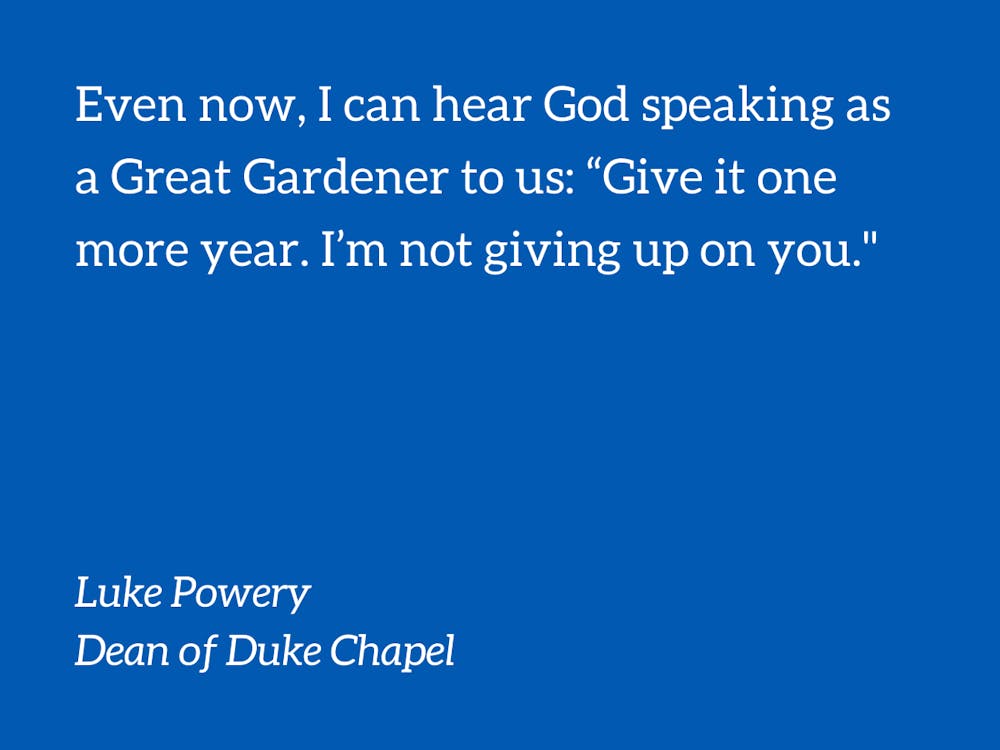Judging by the cherry blossoms outside of Duke Chapel, spring must be here. I welcome it. It’s a time many people decide to get their hands dirty tilling the soil, planting seeds, tending shoots and pruning branches–all so that the plants will bear their delicious fruit. With this natural turn to nature, I want to share a lesson from a Great Gardener: You are made of matter—the dust of the earth—and for that reason alone your life matters.
This lesson comes from a parable Jesus tells in the Bible. In the story, an owner of a vineyard plants a fig tree, but even after three years it bears no fruit, so the owner tells his gardener, “Cut it down! Why should it be wasting the soil?” But the gardener seeks to save the tree saying: “Sir, let it alone for one more year, until I dig around it and put manure on it. If it bears fruit next year, well and good; but if not, you can cut it down.”
It’s a very short story, but if we dig into it, there is an abundance of meaning.
To begin with, there is the owner, the economic strategist, who is not happy and thinks that because of the fig tree’s fruitlessness, it has been a waste of time and soil. There is something true and honest about this. Fruit is not guaranteed in life. We can put in all the work, all the research, all the money, all the time and energy, all the years—three years for this vineyard owner— and still not see any fruit. Some things, some habits, some practices, some relationships, some programs, some organizations, need to die and end because they do not bear fruit.
On the other hand, just because there’s no fruit, and the output is not what we expected, doesn’t mean it is not worth it. I understand the expectations of the vineyard owner, but does something have to bear fruit for it to be of worth and valued, for it to matter? Can’t the tree matter because it is a tree and exists as part of God’s creation?
That is the mindset of the gardener who pleads for mercy for the tree. In his response to the owner, notice he tells the owner that the owner can cut it down if it doesn’t bear fruit—“you can cut it down.” The gardener never volunteers to cut it down himself because—I contend—to the gardener, nothing is ever a waste, even without visible fruit to prove its worth. For the gardener, the fig tree matters because it is still alive. It matters because it is matter.
A further key to the parable comes way back at the start of the Bible in the Book of Genesis, which says, “the Lord God planted a garden eastward in Eden and there he put the man whom he had formed.” As Duke Divinity Professor Norman Wirzba comments about this, in the beginning “God [was] on God’s knees in the soil.” And if God touches the soil, anything in the soil, including a fruitless fig tree is not a waste. Like the gardener in the parable, God is patient and merciful with everything he cultivates.
Even now, I can hear God speaking as a Great Gardener to us: “Give it one more year. I’m not giving up on you. Let’s try one more phone call. Let’s try one more intervention. Let’s try one more therapy session. Let’s try one more gym workout. Let’s try one more surgery. Let’s try one more attempt at reconciliation and healing. Let’s try one more attempt at peace talks. You matter.”
In the present-day world of academia, University of Miami Professor Isaac Prilleltensky does significant research on human mattering and its connection to personal and communal well-being. Check out his co-authored book "How People Matter." He says: “Feeling like we matter is one of the most defining features of our humanity. When that feeling is present, we thrive. When it is absent, we feel ignored and helpless.” He argues that mattering also “prevents personal devaluation, relational disconnection, disengagement from work and disintegration of the social fabric.”
Another person who learned about “mattering” is Oprah Winfrey. When she received the first Bob Hope Humanitarian Award at the Emmys in 2003, she told this story about her father who owned a barber shop:
Every holiday all the transients were always bumming haircuts from my father and asking for money from my dad. All those guys always ended up at our dinner table. I would often say to my father afterwards, ‘Dad, why can’t we just have regular people at our Christmas dinner?’ My father said to me, ‘They are regular people. They want the same thing you want.’ And I would say, ‘What?’ And he said, ‘To be fed.’ At the time I thought he was just talking about dinner, but I have since learned how profound he really was because we are all regular people seeing the same thing. We all just want to know that we matter.
Let’s learn this lesson from Oprah, from Dr. Prilleltensky, and even from God, the Great Gardener. Don’t give up even if you are on a fruitless streak and others want to cut you down. Listen for a whisper of hope: One more year!
The Rev. Dr. Luke A. Powery is Dean of Duke Chapel.
Get The Chronicle straight to your inbox
Signup for our weekly newsletter. Cancel at any time.

